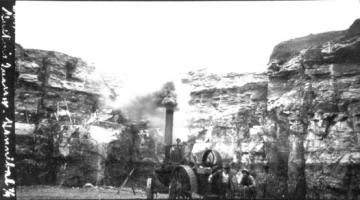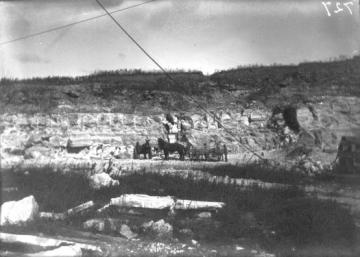Missouri Geological Survey Director: Carey Bridges, RG
Commodity
Limestone is a sedimentary rock that is dominantly composed of the calcium-bearing carbonate minerals calcite and dolomite. Calcite is chemically calcium carbonate (formula CaCO3). Dolomite is chemically calcium-magnesium carbonate (formula CaMg(CO3)2).
Economic Importance

Limestone is used to make a variety of products that are essential to the modern way of life (see Uses section below). The geologic past has endowed Missouri with an abundance of limestone that occurs nearly everywhere in the state, exposed at the surface and buried in the subsurface. For well over a century, Missouri has hosted a robust limestone industry that has mined the rock and processed it into a variety of useful, if not vital, products for Missouri, the nation and the world. Limestone mining and utilization in Missouri began in the mid 1800s. The amount mined prior to 1920 is not known for certain. Since that time, however, reliable statistics do indicate that 3.1 billion short tons of limestone having a present value of about $17.5 billion have been mined in Missouri from 1920 to present. In recent years, 2000 through 2008, average annual limestone production in Missouri was 89 million short tons having an average annual value of $470 million. In 2008, limestone was produced from 94 of the 114 Missouri counties, and the industry employed about 3,000 people with good-paying jobs (Missouri Department of Economic Development). Needless to say, the limestone industry has contributed and continues to contribute greatly to the economic well-being of Missouri and the quality of life of its citizens.
Mineral and Chemical Composition
The minerals calcite and dolomite are the main ingredients of limestone. Both are calcium-bearing carbonate minerals, meaning that they contain the chemical elements calcium (symbol Ca), carbon (symbol C) and oxygen (symbol O). Each carbon atom is combined with three oxygen atoms to form what is called carbonate (formula CO3). In calcite, carbonate is chemically combined with calcium to form calcium carbonate (formula CaCO3). In dolomite, carbonate is chemically combined with calcium and the element magnesium (symbol Mg) to form calcium-magnesium carbonate (formula CaMg(CO3)2). In dolomite there is one magnesium atom for every calcium atom.
The amounts of calcite and dolomite in theoretically pure limestone range continuously from all calcite and no dolomite to all dolomite and no calcite as shown in the Mineral and Chemical Composition of Limestone table. The table also gives the amounts of some important chemical products that can be made from ideally pure limestone. For example, 100 tons of pure limestone that is by weight 70% calcite and 30% dolomite could be processed to yield 86.28 tons calcium carbonate and 13.72 tons magnesium carbonate, or 63.87 tons calcium hydroxide (formula Ca(OH)2) and 9.49 tons magnesium hydroxide (formula Mg(OH)2), or 48.34 tons calcium oxide (formula CaO) and 6.56 tons magnesium oxide (formula MgO), or 34.55 tons elemental calcium metal (Ca) and 3.95 tons elemental magnesium metal (Mg). Also, the calcination (that is, the burning) of this same 100 tons of limestone would produce 45.10 tons of carbon dioxide gas (formula CO2).
Limestone, however, is very rarely pure calcite, pure dolomite, or a pure mixture of the two. It typically contains a variety of accessory rock materials of which quartz, chert, clay and pyrite are among the noteworthy.
Geological vs. Commercial Definition of Limestone: There is an academic, geological definition and a practical, commercial definition of limestone. The geological definition of limestone is a sedimentary rock consisting of at least 50% calcite and dolomite, with less than 50% other rock materials. The practical, commercial definition of limestone is a sedimentary rock consisting of 80% calcite and dolomite, with less than 20% other rock materials. These definitions are depicted on the triangular (or ternary) Geological vs. Commercial Definition of Limestone diagram.

Definition and Classification of Limestone
Basically, commercial limestone is much richer in calcite and dolomite and poorer in other rock materials than most of the limestone as defined by the academic community. Because of its higher purity, commercial-grade limestone is generally stronger, holds up better as a building material, and is less susceptible to being degraded by weathering. It also provides a more concentrated feedstock for production of calcium and magnesium chemical compounds.
Classification of Limestone: Limestone may be divided into four different kinds based on weight percents of calcite and dolomite in the total carbonate portion. They are listed below in order of increasing dolomite content and decreasing calcite content.
- Calcite Limestone: Calcite > 90%, Dolomite < 10%
- Dolomitic Limestone: Calcite 50–90%, Dolomite 10–50%
- Calcitic Dolomite: Calcite 10–50%, Dolomite 50–90%
- Dolomite: Calcite < 10%, Dolomite > 90%
- High-Calcium Limestone: Calcite > 95%, Other Rock Materials < 5%
- Magnesian Limestone: Calcite 90–95%, Other Rock Materials < 5%
Lastly, some dolomites contain an excess of magnesium (Mg) and are called magnesian dolomite or high-magnesium dolomite. The excess magnesium is probably in the form of magnesium carbonate minerals, of which magnesite (MgCO3) is a possible candidate. They plot outside the left margin of the ternary diagram.
Dolomite the Mineral, Dolomite the Rock: Is dolomite a mineral? Is dolomite a rock? Or is it both? The answer is both. Dolomite the mineral is the main constituent in dolomite, the rock. Dolomite the rock is dominantly composed of dolomite, the mineral.
In 1948, geologist Robert Shrock proposed the term dolostone for dolomite rock to avoid confusion with dolomite mineral. Shrock’s dolostone, however, never gained general acceptance in the geological community, largely because the word dolomite was originally used as a name for rocks rich in calcium-magnesium carbonate, and that original rock usage takes precedence. It was afterward that dolomite was used as a mineral name.
This is but one of the many nomenclatural idiosyncrasies that geologists have learned to live with throughout the years. Perhaps some day, some daring geologist will try to stir up the works again by proposing a new name for dolomite the mineral. Maybe “dolomitite!” But don’t hold your breath while you wait.
Main Uses of Limestone
In Missouri, limestone of all kinds is used mainly for aggregate (aka “gravel”) that is produced by crushing and screen-sizing limestone quarry rock. The aggregate is used in concrete, for road surfacing (with or without asphalt or tar binder), and for foundation support beneath weight-bearing structures. Boulder-sized aggregate, known as riprap, is used for stream stabilization and for protection against erosion on steep embankments such as the faces of earthen dams.
High-calcium limestone is used to make Portland cement that is used in concrete and mortars. Portland cement is produced by burning a slurry of finely crushed, high-calcium limestone, clay, sand and a small amount of iron ore in a cement kiln. The pelletal material exiting the kiln is called “clinker.” Gypsum is added, and the clinker-gypsum mixture is finely ground into Portland cement. The burning of limestone in the cement-making process liberates carbon dioxide gas (formula CO2).
Limestone is used in the manufacture of three kinds of lime that have a wide range of uses. Aglime is simply pulverized limestone. It is used as a soil conditioner to neutralize acidity and to add calcium and magnesium nutrients.
Quicklime is calcium oxide (formula CaO) that is produced by calcining (burning) high-calcium limestone in a lime kiln to drive out the carbon in the form of carbon dioxide gas (formula CO2). Quicklime is used as a soil stabilizer, as a flux in the manufacture of steel and ceramics, and to remove sulfur dioxide and hydrogen chloride from flue gas emissions. The accompanying table can be used to estimate quicklime yield for different kinds of pure limestone.
Hydrated lime is made by mixing quicklime with water to create calcium hydroxide (formula Ca(OH)2). Hydrated lime, also known as slaked lime, is used to filter potable water supplies and to treat solid and liquid waste. It is used as a soil stabilizer and as an additive in petroleum refinement. The accompanying table can be used to estimate the amount of hydrated lime that can be made from different kinds of pure limestone.
Other Uses of Limestone
- Limestones that are sufficiently dense and durable and not fractured may be cut into “marble” blocks that are used for dimensional building stone and architectural enhancement.
- Some “manufactured” sands are made from crushed limestone.
- Manufacture of brick and tile.
- Filler material in synthetic floor coverings.
- Carrier material in pesticide granules.
- Filler material in fungicides.
- Dusting agents to prevent explosions in underground coal mines.
- Calcium source in foods and food supplements.
- Pharmaceuticals.
- Source of calcium and magnesium for chemicals.
- Sugar extraction process.
- Manufacture of glass, paper, plastics, thermoplastics, rubber, ink, paint, whitewash, dyes, adhesives, coatings and sealants.
Properties of Limestone
Color: Variable; typically white, gray or tan; can also occur in shades of yellow, green, blue, brown, pink and red. Some limestone is black.
Hardness: Three to four on Mohs scale (i.e., harder than fingernail but softer than knife blade).
Bulk Density: This measure of heaviness is variable between limits, depending on the relative amounts of calcite and dolomite minerals in the rock and on the porosity of the rock. Representative bulk density values for intact rock are tabulated below. They are based on calcite and dolomite having specific gravities of 2.71 and 2.86, respectively. It should be noted that the values given for 50% porosity rock are the approximate bulk densities for volumes of crushed limestone aggregate.
Calcite Limestone: 169 pounds per cubic foot for 0% porosity rock
84.5 pounds per cubic foot for 50% porosity rock
Dolomitic Limestone and Calcitic Dolomite: 169-178 pounds per cubic foot for 0% porosity rock
84.5-89 pounds per cubic foot for 50% porosity rock
Dolomite: 178 pounds per cubic foot for 0% porosity rock
89 pounds per cubic foot for 50% porosity rock
Solubility: A piece of limestone about the size of a pinhead is all that will dissolve, though very slowly, in one gallon of pure water, with the calcite being a little bit more soluble than the dolomite. Therefore, limestone is only slightly soluble in pure water. However, solubility increases dramatically with increasing water acidity, which is accomplished by adding acids, either inorganic or organic, or by adding acid-forming gasses such as carbon dioxide and the oxides of sulfur and nitrogen to water. Limestone dissolves readily and effervescently in strong acids with the generation of carbon dioxide gas, and the rapidness of the reaction increases with increasing calcite content. This fact provides the basis for a simple field test that can be used to distinguish between limestone that is dominantly calcite from limestone that is dominantly dolomite. The test involves applying a drop of 10% hydrochloric acid to the rock and observing the intensity of the effervescence or “fizz,” which is vigorous for limestone containing lots of calcite and weak to barely detectable for limestone containing lots of dolomite. If the test is repeated on powdered rock, which is readily generated by hitting or scratching the rock with the pick-end of a hammer, the fizz is violently vigorous when mostly calcite is present and weak to moderate when mostly dolomite is present
Toxicity: Calcite and dolomite, which are the primary minerals that make up limestone, are non-toxic. However, quicklime (CaO), which is made from calcitic limestone, is a caustic alkaline substance that can irritate or burn living tissue.
Occurrence of Limestone in Missouri
Limestone occurs at the surface or in the subsurface in about 99% of Missouri, as indicated on the Generalized Occurrence of Limestone in Missouri map. The deepest occurrence is in the extreme southeast part of the state, where limestone that resides buried beneath thick Tertiary and Cretaceous rock strata is known to extend down to at least 5,000 feet depth and probably several thousand feet deeper. The next deepest occurrence is in the extreme northwest part of the state, where limestone occurs down no further than about 4,000 feet. Limestone is absent altogether in the St. Francois Mountains area in southeast Missouri, occurring neither at the surface nor in the subsurface.
The oldest limestones occur in a sequence of Lower Ordovician and Cambrian rock strata that directly and unconformably overlies much older Precambrian igneous basement rock. These limestones are dominantly calcitic dolomite and dolomite, and they occur in about 99% of the state, being exposed at the surface (about 36% of state) and buried in the subsurface (about 63% of state). In places, particularly around the St. Francois Mountains, some of these limestones are high-magnesium dolomite. Important commercial limestone units in this sequence, listed in ascending stratigraphic order, include Bonneterre Formation, Derby-Doerun Dolomite, Potosi Dolomite, Eminence Dolomite, Gasconade Dolomite and Jefferson City-Cotter-Powell-Smithville dolomites. Most of these limestones are usually crushed into aggregate for general purpose use that does not require stringent chemical or physical properties specifications. They are not suitable for making cement or lime, and they are generally not suitable for concrete aggregate. Some have been used for dimension stone. Most noteworthy is stone from the Quarry Ledge, which a thick- and massive-bedded dolomite in the Jefferson City Dolomite. In the 1800s and very early 1900s, it was locally cut and hewed into blocks that were used for laying building foundations and sometimes for building entire structures. The foundations of the Rolla Building and Norwood Hall on the Missouri University of Science and Technology campus, located in Rolla, provide testimony for the durability of this particular dimension stone. Also, the “Old Jail” in the town of Vienna was constructed entirely from Quarry Ledge stone.
The next oldest limestones occur in a sequence of Mississippian, Devonian and Upper Ordovician rock strata that overlies the Middle and Lower Ordovician and Cambrian sequence. They are dominantly calcite limestones and dolomitic limestones with some dolomites. They exist in about 58% of the state, being exposed at the surface (about 30% of state) and buried in the subsurface (about 28% of state). In places, some of the limestones are high-calcium limestone. Important commercial limestone units, listed in ascending stratigraphic order, include Joachim Dolomite, Pecatonica Formation limestone, Plattin Group limestone, Kimmswick Limestone, Bailey Formation limestone, Little Saline Limestone, Grand Tower Limestone, Callaway-Cooper-Mineola facies of Cedar Valley Limestone, Chouteau Group Compton Limestone and Sedalia Formation, Pierson Limestone, Burlington-Keokuk limestones, Warsaw Formation limestone, Salem Formation limestone and St. Louis Limestone. This suite contains the highest-quality limestones in the state. They tend to make excellent general purpose aggregate. Several of them are of such high quality that they are used for making cement, lime, and premium concrete aggregate. The vast majority of what has been marketed as Missouri marble has come from this sequence. Marble for use as dimension stone and ornamental work was quarried in large amounts from the Grand Tower, Little Saline and Kimmswick limestones at the Ozora and Inkley quarries in eastern St. Genevieve County; from the Burlington Keokuk Limestone at the Phenix quarry in northwestern Greene County; and from the Warsaw Formation at the Carthage Marble quarries in central Jasper County. Stone from these quarries was used in the construction of more than 100 mostly public buildings across the United States, including the National Archives Building in Washington, D.C.
The youngest limestones occur in the Pennsylvanian sequence of rock strata that overlies the Mississippian-Devonian-Upper Ordovician sequence. They are dominantly calcite limestone, are rarely dolomitic, and tend to be argillaceous, meaning that they tend to contain some clay minerals. Typically, the limestone units are relatively thin and are separated by shaly strata of comparable thickness. They occur at the surface and in the shallow subsurface in about 28% of Missouri, specifically in the northwest and western portions of the state, with a local occurrence in the St. Louis area. Important commercial limestone units, listed in ascending stratigraphic order, include Higginsville Limestone, Bethany Falls Limestone, Winterset Limestone, Argentine Limestone, Spring Hill Limestone, Stoner Limestone, Plattsmouth Limestone, Kereford Limestone and Ervine Creek Limestone. All of these limestones are of average quality, meaning they may be used for most purposes but are less than ideal. Some were used to manufacture cement in the Kansas City area, but are no longer used for that purpose. They are usually not ideal for concrete aggregate or dimension stone, largely because of their tendency to be argillaceous, which renders the rock somewhat soft and weak, moisture absorbent and susceptible to freeze-thaw spalling. However, local stone encountered during excavation for the Nelson Gallery of Art in Kansas City was used in the vestibule at the south entrance of the gallery.
Chemical and Physical Properties of Missouri Limestone
Geologic Origin of Limestone: Most limestone forms in warm, shallow-marine environments through the precipitation of calcium carbonate (CaCO3) out of seawater. The precipitate settles to the seafloor and accumulates as a blanket of carbonate mud. The calcareous remains of marine organisms, including the tests and shells of invertebrate animals and the remains of calcareous algae accumulate along with the carbonate mud and become incorporated in it. Often, sand-size particles of calcium carbonate, such as ooids and the fecal pellets of bottom-dwelling, mud-eating invertebrates, are also added to the mix. The result is carbonate sediment that contains an assortment of different-size particles of various local origins. The sediment is progressively buried and compacted by the accumulation of more calcium carbonate sediment. Under certain conditions, magnesium ions in seawater may replace some of the calcium in the sediment, resulting in sediment than is dolomitic. When the sediment becomes buried deep enough and is sufficiently compacted, it lithifies into calcitic limestone or dolomitic limestone rock. Limestone that contains visible fossil remains is called fossiliferous limestone. Triangle Plots for 62 Limestone Units in Missouri.
Calcitic dolomite and dolomite form mostly in the shallow to deep burial environment, where magnesium in circulating subsurface waters partially replaces calcium and converts calcium-rich limestone into magnesium-rich limestone through a process called dolomitization, which is nearly complete for dolomite and partially complete for calcitic dolomite. The dolomitization process typically obliterates fossil remains and other carbonate sedimentary particles that originally composed the rock. Stone Resources database.
Mining
Limestone has been a valuable resource since Missouri became a state. In early open pit operations, limestone was mined and crushed by hand and removed from the quarries by mules, carts and tramways.
Limestone is now mined using surface and underground methods. Surface quarrying is the most common method of producing limestone in Missouri. Also, it is typically the most economical method. Many surface operations are simply hillside cuts or open pit quarries. Controlled blasting at the quarry face is used to break the rock into pieces. If necessary, this material is further reduced to various size grades by rock crushers. The rock is then screen-separated and cleaned.
Underground mining is performed using the room-and-pillar method, which involves the removal of limestone “rooms” while leaving an array of “pillars” to support the overlying roof. These operations can be extensive and often encompass many acres. Underground mining is commonly used when a specific rock layer is desired in areas where there is thick material overlying the desired rock. In this instance it is more economical to mine horizontally underground, following the rock unit, without removing all the overburden. The rock is processed using the same methods employed at surface quarries.
|
|
|
|
|
|
|
|
|
|
Production History
- In 2008, Missouri ranked 4th in the nation for limestone production (U.S. Geological Survey Minerals Information).

Additional Reading
- Search the Missouri Geology Bibliography
- Limestone, Missouri's Billion Dollar Industry
- The Geologic Column of Missouri
Visit the department’s Ed Clark Museum of Missouri Geology, where you will find limestone on display.
Nothing in this document may be used to implement any enforcement action or levy any penalty unless promulgated by rule under chapter 536 or authorized by statute.
For more information
Geological Survey Program
Missouri Geological Survey
P.O. Box 250
Rolla, MO 65402-0250
United States







